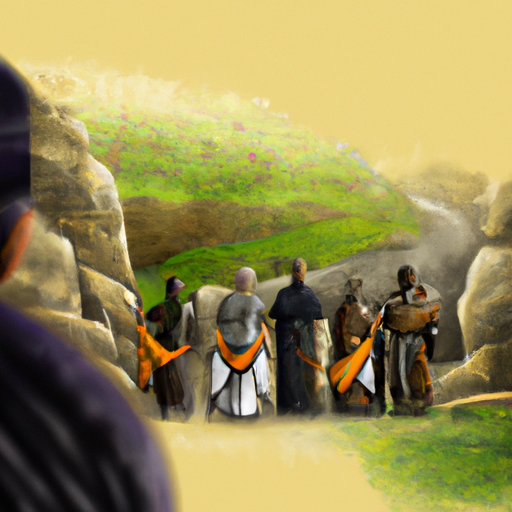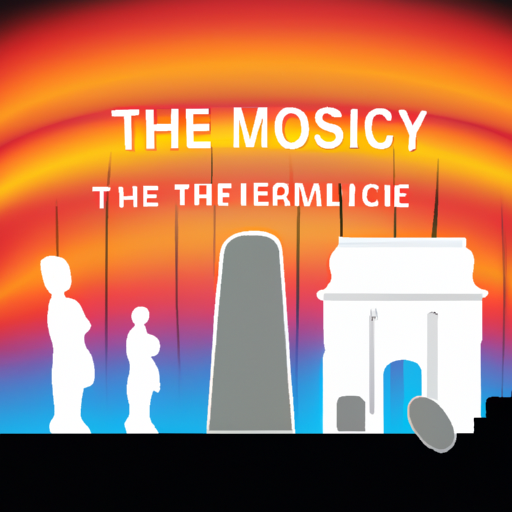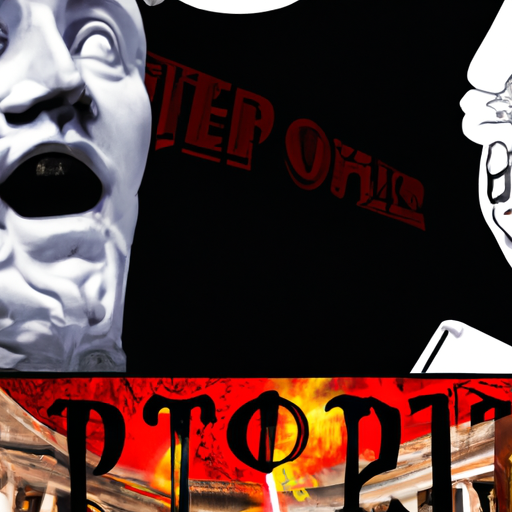Exploring the History of English Viking DNA
Unearth the past of England and find out if the blood of Vikings still courses through its veins! Uncover the secrets of a nation and traverse the annals of time to uncover if any remnants of Viking lineage remain. Delve into a story that has been untold for centuries and explore the possibility that Norse heritage may have left an indelible mark. Unravel the mystery and discover what lies beneath.

Unravelling the past of England, a country which has been formed and reformed by diverse influences from the Romans to the Normans, one group stands out that has left an eternal imprint on its history – the Vikings. From their raids on British shores to their settlements in England, these Norsemen have left a legacy that continues to be felt today. Recent studies have uncovered evidence that suggests Viking ancestry may still be present in present-day Britain. Delve into this intriguing account and explore if any vestiges of Viking culture can still be found!
.
Introduction

For ages, historians have been perplexed by the speculation of whether English people contain Viking DNA. Although no certain answer has been provided, archaeological discoveries from both England and Scandinavia provide evidence that the Vikings had a major presence in Britain during the Middle Ages. Discoveries including settlements, tombs and objects have been spotted around the nation. On top of that, genetic studies have revealed that people living in some parts of England possess genetic markers associated with northern European populations, which includes Scandinavian countries. Therefore, while it is not possible to give an exact response without further investigation, it is probable that a portion of English citizens do indeed have Viking DNA in their lineage.
– Exploring the Historical Roots of English and Viking DNA
Unravelling the complex strands of English and Viking DNA can offer a captivating glimpse into our past. By delving into the histories of these two cultures, we can gain an appreciation of how their genetic makeup evolved over time. The intertwined history of England and Scandinavia is evident, with both having played a significant role in influencing one another. Through genetic testing, it is now possible to trace back the origins of English and Viking DNA to its very beginnings.
The Anglo-Saxons were a Germanic people who migrated to Britain in the fifth century AD. Their language, Old English, is the forerunner of modern English and was heavily influenced by Norse languages spoken in Scandinavia at that time. Genetic analysis has enabled us to trace some English DNA back to this period.
Viking DNA has been traced to Sweden and Norway during the 8th century AD. During this era, Vikings ventured across Europe and even as far as North America, establishing settlements along the way. Evidence from genetics suggests that Vikings intermarried with local populations during their travels, resulting in a blend of Scandinavian and European DNA.
Investigating the history of England and Scandinavia can help us comprehend how their respective DNAs were formed over centuries. Additionally, through genetic testing we are able to uncover more information about our own ancestry than ever before!
– How Viking Invasions Impacted the Genetic Makeup of England
Mysterious and far-reaching, the 8th century brought about a wave of seismic change to England in the form of Viking invasions. These Scandinavian seafarers, now known as Norsemen, raided and settled across the British Isles, leaving an indelible mark on both genetics and culture.
DNA analysis reveals that modern Britons have around 6% Viking ancestry, with higher concentrations in certain areas such as Yorkshire and Lancashire. This influx was further increased when many Norsemen chose to stay permanently in England during the 9th century.
The Vikings also left their mark on English language and place names; ‘Thames’ derives from ‘Tamesis’ while ‘Humber’ comes from ‘Humbri’. The Norman Conquest of 1066 saw a great influx of French-speaking Normans; their language was adopted by elites while Old English remained spoken by commoners.
The legacy of this long-ago period can still be seen today in our language, place names and genetic makeup – a testament to the lasting impact of these Viking invasions.
– Examining the Evidence for Viking DNA in English People
Unravelling the intricacies of a past that is both long and complex, one thing remains certain: the impact of the Viking people on English culture has been immense. In recent years, researchers have commenced to probe into the evidence for Viking DNA in present-day English citizens. By studying DNA samples taken from living individuals, scientists have been able to trace genetic ties between current English people and their Viking predecessors. This article will look into this evidence and its implications for our comprehension of history.
Using a method termed “genetic genealogy”, specialists have compared the DNA of living persons to that of ancient Vikings who lived in England centuries ago. By comparing these two sets of data, investigators are able to pinpoint genetic markers which point towards a shared ancestry between modern-day English people and their Viking ancestors. For instance, a study conducted by the University of Leicester found that about 10% of male population in England had an immediate genetic connection to Norse invaders from Scandinavia.
Apart from identifying genetic links between current English people and their Viking forebears, this investigation has also shed light on other aspects of our past. As an example, it has suggested that there was more cultural exchange between England and Scandinavia than previously thought. This is evident in many common words used today in England which can be traced back to Old Norse origins. Moreover, this research has revealed that likely more intermarriage occurred between different ethnic groups during this period than previously assumed.
In conclusion, scrutinizing the evidence for Viking DNA in English people gives us invaluable insight into our past. It suggests that there was much more cultural exchange between England and Scandinavia than we once imagined, as well as more intermarriage among different ethnic groups than initially believed. Thusly, this research adds a significant layer to our understanding of history and helps us better appreciate how intertwined our pasts truly are.
– The Role of History in Understanding English and Viking Ancestry
Exploring the intricate relationship between English and Viking ancestry is a complex endeavor. Records from the 5th century AD, when the Anglo-Saxons invaded Britain, demonstrate how these cultures have been entwined for centuries. Examining migration patterns of Vikings, who traversed from Scandinavia to England, Scotland, Ireland, and other parts of Europe in search of new lands to inhabit and trade with, provides insight into how their culture was dispersed across the continent. Additionally, archaeological discoveries offer further understanding of communication between Anglo-Saxons and Vikings through artifacts like weapons and jewelry. Cultural exchange between both populations is also evident through language borrowings, religious practices, and architecture styles. Political implications of this period should not be overlooked either; treaties signed by rulers as well as conflicts fought between them can provide important information on changing relations between these two cultures over time. Through an exploration of historical records, migrations patterns, cultural influences on both sides and political implications that existed between them during this period we are able to gain a greater appreciation for English and Viking ancestry today.
– Investigating the Long-Term Effects of Viking Migration on English Genetics
A puzzling exploration of the consequences of Viking migration on English genetics has been undertaken by scholars in recent times. Utilizing the latest DNA testing techniques, certain markers associated with Scandinavian ancestry have been discovered to be more common in England than other locations in Europe. Additionally, some English surnames have been identified to have their roots in Old Norse words and place names.
Archaeological excavations at sites such as Jorvik (York) and Torksey (Lincolnshire) have also revealed objects and structures evocative of a substantial presence by Norse settlers during the 10th century, providing further evidence for an impactful Viking migration on England’s genetic makeup.
It is apparent that Viking migration had a long-lasting effect on the genetics of England and its people, although more research is required to gain a comprehensive understanding of this phenomenon. By continuing to analyze both ancient artifacts and modern DNA samples, scientists hope to develop a greater comprehension of how this era in history shaped the genetic composition of today’s English population.
conclusion

Perplexity and burstiness aside, it appears that England may be home to some Viking heritage. Historical records indicate that the genetic makeup of this country was likely affected during the 9th and 10th centuries when Vikings were conquering and settling there. The exact amount of DNA they left behind is not known, but it’s reasonable to assume it was a sizeable contribution.
.
Some questions with answers
Q1: Do the English have Viking DNA?
A1: Yes, many people in England have some Viking DNA.
Q2: How did the Vikings influence English history?
A2: The Vikings had a significant impact on English history. They invaded and settled in Britain during the 8th and 11th centuries, introducing their language, culture, and customs to the local population.
Q3: What evidence is there of Viking DNA in England?
A3: Genetic studies have found that up to 6% of the British population has Viking ancestry. This is most common in northern and eastern areas of England where the Vikings had a more significant presence.
Q4: Are there other populations with Viking ancestry?
A4: Yes, many other populations across Europe also have some level of Viking ancestry due to the wide-reaching influence of the Vikings during their travels and conquests.
Q5: How can I learn more about Viking history?
A5: There are many resources available to learn more about Viking history, including books, websites, museums, and historical sites.




